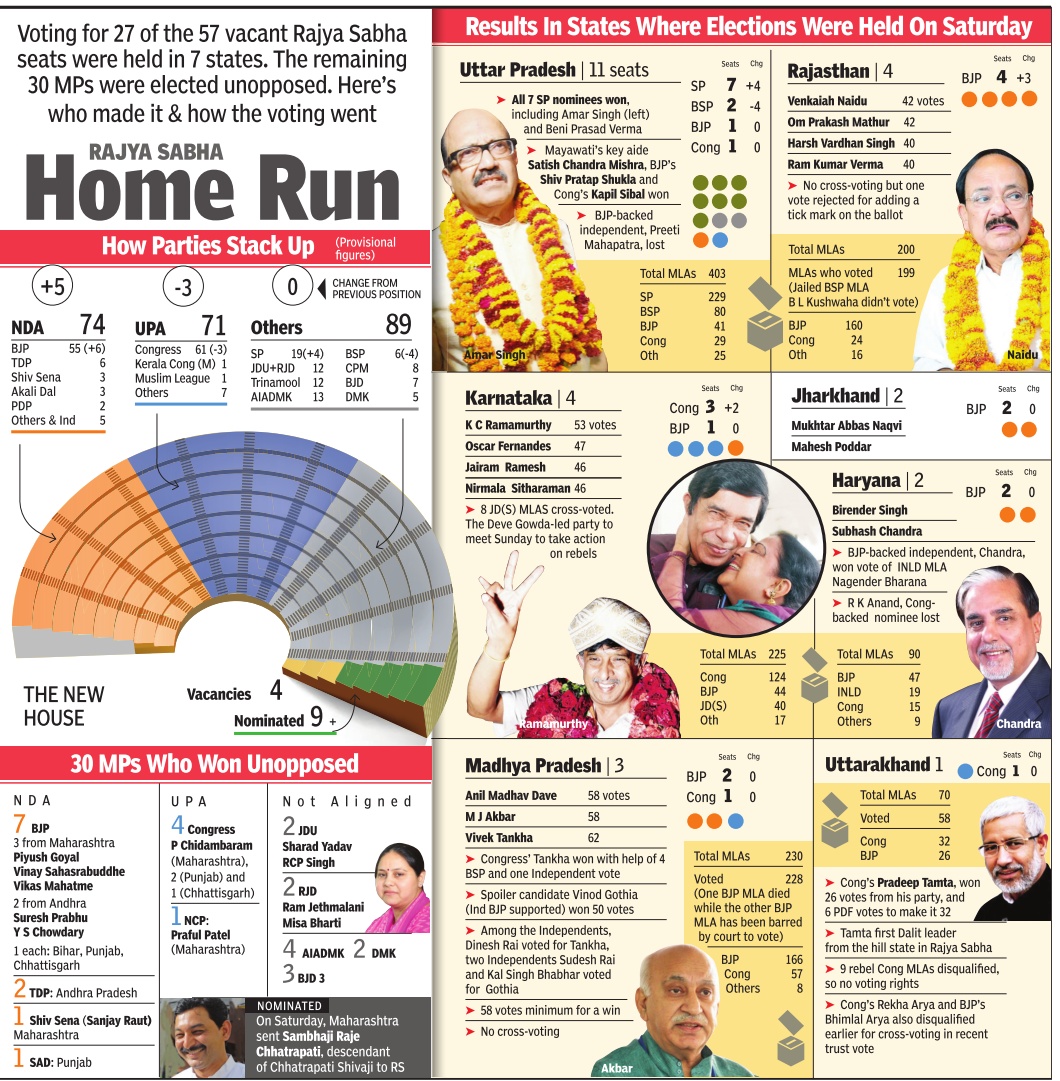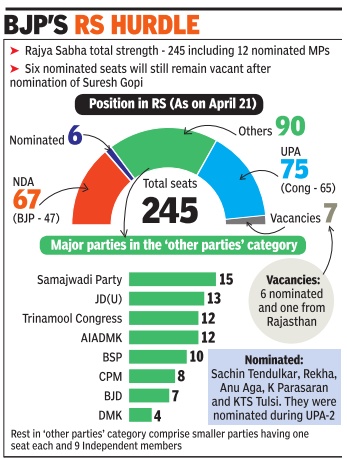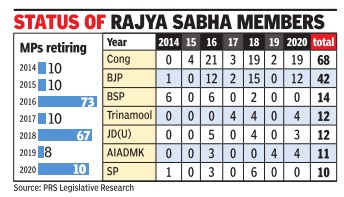Rajya Sabha
(→2016, party positions) |
|||
| Line 16: | Line 16: | ||
[[Category:Politics |R ]] | [[Category:Politics |R ]] | ||
| + | |||
| + | =Elections= | ||
| + | ==Dispute in 2017== | ||
| + | [http://epaperbeta.timesofindia.com/Article.aspx?eid=31808&articlexml=CEC-went-by-rulebook-to-invalidate-two-votes-10082017001021 CEC went by rulebook to invalidate two votes, August 10, 2017: The Times of India] | ||
| + | |||
| + | |||
| + | The entire Gujarat bureaucracy was talking animatedly about how Chief Election Commissioner Achal Kumar Joti mustered the courage to defy BJP by invalidating the votes of two rebel Congress legislators. | ||
| + | |||
| + | Gujarat bureaucrats, who have worked with Joti or known him, weren't surprised. They said Joti, a soft-spoken and conservative academic, is a stickler for rules. A 1975 batch IAS officer of Gujarat cadre, he had also served as Gujarat chief secretary . | ||
| + | |||
| + | When Congress demanded invalidation of two votes cast in BJP's favour in the Rajya Sabha polls, Joti's junior colleagues in Gandhinagar knew that the results were unlikely to be announced before midnight. Because Joti “will go by every word in the rule book,“ said a senior IAS officer who had worked with him for 17 years. When TOI asked Chief Election Commissioner Achal Kumar Joti about how he had resolved Tuesday's tangle related to Gujarat's Rajya Sabha election results, he said, “We took the legal position after examining the complaint, listening to delegations of both the parties, considering the returning officer's report, and watching video records. We then decided to invalidate the two votes.“ | ||
| + | |||
| + | He added that before invalidating the votes, the EC had gone through the legal provisions and previous circulars issued on similar matters. On Tuesday , even as the tense drama was on, Joti's colleagues were intrigued by the rumour that the CEC may have consulted the PMO before going by the rule book. | ||
| + | |||
| + | Joti's decision has been subject to various interpretations. One view is that the EC had no option in the face of video evidence. | ||
| + | |||
| + | A voter showing his ballot to a person other than the authorised polling agent was clearly a violation of the secret ballot rule. | ||
| + | |||
| + | Earlier in July this year, a spate of resignations by Congress MLAs had left the party with few options and Ahmed Patel's defeat seemed inevitable. It may be recalled that some Congress MLAs had voted for NDA candidate Ram Nath Kovind even in the presidential election. Hence, this time, the Congress was better prepared to counter BJP's plans. During the dispute over validity of two votes, the BJP had put forward four sets of arguments before the Election Commission (EC) of India, all of which were rejected one by one in the final order issued by the EC on Tuesday night. The first submission was that the secrecy of ballot principle did not apply to a vote in elections to the Rajya Sabha. The BJP argued that once the vote is revealed, even if only to the authorised party agent, the vote no longer remains secret. | ||
| + | |||
| + | The EC however rejected this argument saying that open ballot only meant that the vote was to be shown to the party agent and none other. | ||
| + | |||
| + | Secondly , the BJP argued that the nowhere did Section 39AA of Conduct of Election Rules prefix `only' with the `authorised party agent'. The rea soning behind is that unless expressly stated in the rules that `only' the agent can be shown the vote, it was perfectly valid to show it to others. | ||
| + | |||
| + | The BJP's third contention was that the EC's jurisdiction ended after the ballot had been cast and inserted in the ballot box. Beyond this point, only the high court could intervene, the party had claimed.But the EC disagreed saying that its sweeping powers of superintendence over elections extend right up to the declaration of results. | ||
| + | |||
| + | Fourth, the BJP questioned as to why the returning officer or authorised party agent had not found anything amiss when the ballot was being cast and raised the matter only later when it was apparent that the Congress did not have the requisite numbers.The EC, however, said it had the final word on disputes regarding conduct of elections and that the returning officer was required to get a go-ahead from EC, first to start the counting and finally for declaration of the results. | ||
| + | |||
| + | Joti, a 1975 batch IAS officer, served in various capacities in Gujarat, including as chairman, Kandla Port Trust (KPT) between 1999 and 2004.He is given the credit for putting the KPT back on track in just 21 days after the 2001 earthquake and after a cyclone. “He knew most junior engineers and even peons by name. In fact, anyone could walk into his office and discuss with him,“ says a former retired KPT colleague. | ||
| + | |||
| + | Joti has also served as chairman of Gujarat State Petroleum Corp Ltd and Gujarat State Fertilizers & Chemicals Ltd. He was also a secretary of industry , revenue and water supply departments.Prior to becoming the Gujarat chief secretary in January 2010, Joti headed the Sardar Sarovar Narmada Nigam Ltd.After his retirement in January 2013, he served as Gujarat vigilance commissioner. | ||
| + | |||
| + | One of Joti's junior IAS colleagues recalls that in December 2009, Joti had come under the spotlight when CM Narendra Modi first indicated that he may make Joti the state's next chief secretary.Ignoring Balwant Singh, who was senior ACS (home) at the time, Modi had praised Joti for his “exemplary work“ by remaining in rural areas till late in the evening. | ||
| + | |||
= Nominated members= | = Nominated members= | ||
[http://epaperbeta.timesofindia.com/Article.aspx?eid=31808&articlexml=Questions-over-absence-of-Sachin-Rekha-in-RS-31032017018027 Questions over absence of Sachin, Rekha in RS| Mar 31 2017 : The Times of India (Delhi)] | [http://epaperbeta.timesofindia.com/Article.aspx?eid=31808&articlexml=Questions-over-absence-of-Sachin-Rekha-in-RS-31032017018027 Questions over absence of Sachin, Rekha in RS| Mar 31 2017 : The Times of India (Delhi)] | ||
Revision as of 18:50, 12 August 2017
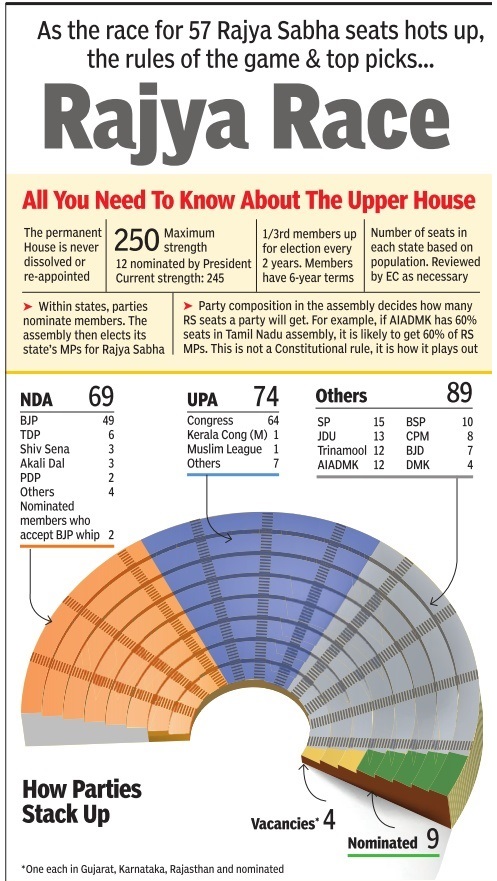
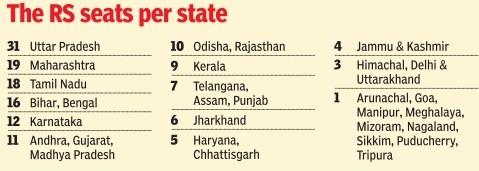
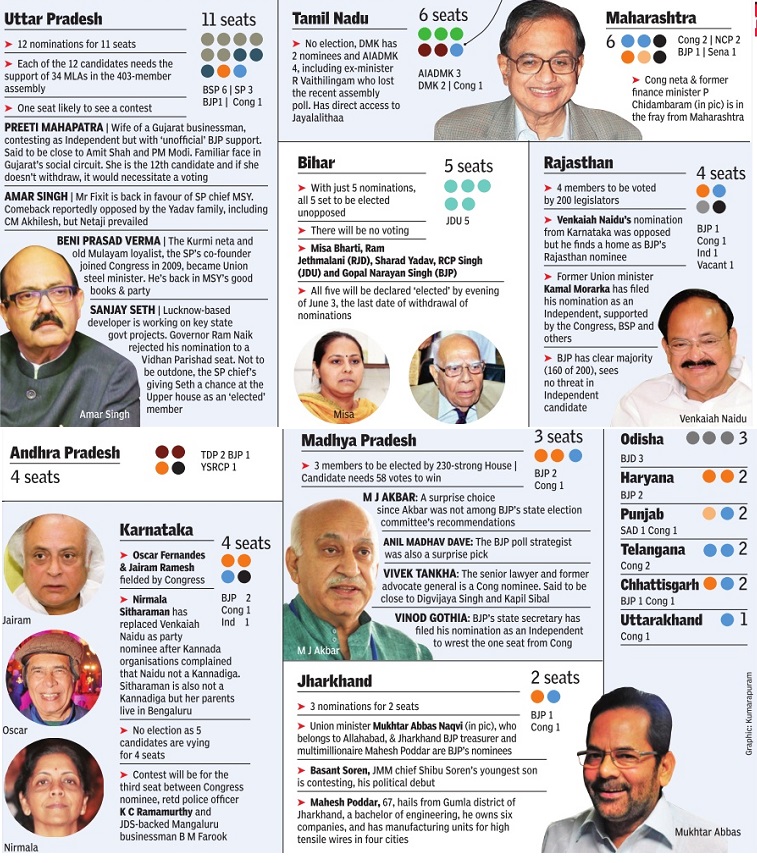
This is a collection of articles archived for the excellence of their content. |
Contents |
Elections
Dispute in 2017
CEC went by rulebook to invalidate two votes, August 10, 2017: The Times of India
The entire Gujarat bureaucracy was talking animatedly about how Chief Election Commissioner Achal Kumar Joti mustered the courage to defy BJP by invalidating the votes of two rebel Congress legislators.
Gujarat bureaucrats, who have worked with Joti or known him, weren't surprised. They said Joti, a soft-spoken and conservative academic, is a stickler for rules. A 1975 batch IAS officer of Gujarat cadre, he had also served as Gujarat chief secretary .
When Congress demanded invalidation of two votes cast in BJP's favour in the Rajya Sabha polls, Joti's junior colleagues in Gandhinagar knew that the results were unlikely to be announced before midnight. Because Joti “will go by every word in the rule book,“ said a senior IAS officer who had worked with him for 17 years. When TOI asked Chief Election Commissioner Achal Kumar Joti about how he had resolved Tuesday's tangle related to Gujarat's Rajya Sabha election results, he said, “We took the legal position after examining the complaint, listening to delegations of both the parties, considering the returning officer's report, and watching video records. We then decided to invalidate the two votes.“
He added that before invalidating the votes, the EC had gone through the legal provisions and previous circulars issued on similar matters. On Tuesday , even as the tense drama was on, Joti's colleagues were intrigued by the rumour that the CEC may have consulted the PMO before going by the rule book.
Joti's decision has been subject to various interpretations. One view is that the EC had no option in the face of video evidence.
A voter showing his ballot to a person other than the authorised polling agent was clearly a violation of the secret ballot rule.
Earlier in July this year, a spate of resignations by Congress MLAs had left the party with few options and Ahmed Patel's defeat seemed inevitable. It may be recalled that some Congress MLAs had voted for NDA candidate Ram Nath Kovind even in the presidential election. Hence, this time, the Congress was better prepared to counter BJP's plans. During the dispute over validity of two votes, the BJP had put forward four sets of arguments before the Election Commission (EC) of India, all of which were rejected one by one in the final order issued by the EC on Tuesday night. The first submission was that the secrecy of ballot principle did not apply to a vote in elections to the Rajya Sabha. The BJP argued that once the vote is revealed, even if only to the authorised party agent, the vote no longer remains secret.
The EC however rejected this argument saying that open ballot only meant that the vote was to be shown to the party agent and none other.
Secondly , the BJP argued that the nowhere did Section 39AA of Conduct of Election Rules prefix `only' with the `authorised party agent'. The rea soning behind is that unless expressly stated in the rules that `only' the agent can be shown the vote, it was perfectly valid to show it to others.
The BJP's third contention was that the EC's jurisdiction ended after the ballot had been cast and inserted in the ballot box. Beyond this point, only the high court could intervene, the party had claimed.But the EC disagreed saying that its sweeping powers of superintendence over elections extend right up to the declaration of results.
Fourth, the BJP questioned as to why the returning officer or authorised party agent had not found anything amiss when the ballot was being cast and raised the matter only later when it was apparent that the Congress did not have the requisite numbers.The EC, however, said it had the final word on disputes regarding conduct of elections and that the returning officer was required to get a go-ahead from EC, first to start the counting and finally for declaration of the results.
Joti, a 1975 batch IAS officer, served in various capacities in Gujarat, including as chairman, Kandla Port Trust (KPT) between 1999 and 2004.He is given the credit for putting the KPT back on track in just 21 days after the 2001 earthquake and after a cyclone. “He knew most junior engineers and even peons by name. In fact, anyone could walk into his office and discuss with him,“ says a former retired KPT colleague.
Joti has also served as chairman of Gujarat State Petroleum Corp Ltd and Gujarat State Fertilizers & Chemicals Ltd. He was also a secretary of industry , revenue and water supply departments.Prior to becoming the Gujarat chief secretary in January 2010, Joti headed the Sardar Sarovar Narmada Nigam Ltd.After his retirement in January 2013, he served as Gujarat vigilance commissioner.
One of Joti's junior IAS colleagues recalls that in December 2009, Joti had come under the spotlight when CM Narendra Modi first indicated that he may make Joti the state's next chief secretary.Ignoring Balwant Singh, who was senior ACS (home) at the time, Modi had praised Joti for his “exemplary work“ by remaining in rural areas till late in the evening.
Nominated members
Questions over absence of Sachin, Rekha in RS| Mar 31 2017 : The Times of India (Delhi)
SP member Naresh Agarwal pointed out, “There are 12 nominated members in RS according to provisions of the Constitution. The council of ministers recommends their names after which President nominates them. These people have been nominated to represent Parliament but we don't see them (in the House).“
2017
Besides Sachin Tendulkar and actress Rekha, other nominated members included Anu Aga, Sambhaji Chhatrapati, Swapan Dasgupta, Roopa Ganguly , Narendra Jadhav, M C Mary Kom, K Parasaran, Gopi Suresh, Subramanian Swamy and KTS Tulsi.
SP member Naresh Agarwal questioned the continued absence of sportspersons and Bollywood stars, nominated to Rajya Sabha, from the House even as he cited the case of Sachin Tendulkar for not being present during the session.
Without taking any name, Agarwal said a Bollywood actress has also not been attending Parliament and had not come to the House during the session. “If they are not interested, shouldn't they resign,“ he asked.
Agarwal had raised the issue through a `point-of-order' when the House met for the day . Deputy chairman P J Kurien said this was not a point of order and Agarwal could use his good offices to convince the nominated members to be present in the House for a few days.
Parliamentary behaviour
Etiquette towards women
Mar 23 2015
Dhananjay Mahapatra
In a BBC documentary on the Nirbhaya case, two advocates forgot lessons from their noble profession and blurted out their obscurantist views on women.Civil society roundly condemned them. Women lawyers have moved the Supreme Court seeking appropriate punishment for them. The controversy had hardly died down when JD(U) president Sharad Yadav, in Rajya Sabha, spoke in a derogatory tone about south Indian women. As a member of the House of Elders, a known Lohia follower and a lawmaker, a responsibility was cast on him not to lower the dignity of women. Only he can answer why he made the anti-women statement during a an insurance bill discussion. His comments were in no way an insurance to maintaining dignity of women in the country . It evoked protests from DMK MP Kanimozhi.She was made to sit down by House members , who were cackling at Yadav's ludicrous description of south Indian women. Yadav did not realize the gravity of his utterance and repeated it the next day in the House.
This time, HRD minister Smriti Irani stood up and lodged a strong protest. Yadav challenged her to a debate, reiterating that he had not said anything wrong. This meant he believed in the correctness of his pathetic comments.When Irani reminded him about the harm his comments were causing to women's dignity in general, an unrepentant Yadav mockingly told her “I know what you are.“
He actually meant to tell her “you know who I am“ and silence her with his political weight. Absence of support from the “el ders“, which included Irani's colleagues in the Cabinet, emboldened him to challenge her in an unpleasant way . Did he not deserve to be censured by the House of Elders, members of which are regarded as the Parliament's conscience keepers ? Can there be two standards one for commoners and another for MPs when it comes to censuring one for derogatory comments on women? Only after finance minister Arun Jaitley sought a clarification two days later did Yadav express “regret“ without tendering an apology . Yadav had recently taken the lead in gathering signatures of MPs in RS to move a motion for removal of a MP HC judge for alleged sexual harassment of a judicial officer. Forgetting that act of his, he spoke in a crude manner on women in Parliament.
Did he understand that his comments made a huge dent in his standing as an MP? Did RS members realize their complicit reaction to Yadav's comments dented the dignity of women as a whole? There cannot be two standards when it comes to punishing people who make public assault on dignity of women through their utterances. If civil society condemned the two advocates, the House of Elders should have taken appropriate action against Yadav to assure women that it will not tolerate any misdemeanour against them.Similar double standards was shown by Maharashtra when it banned dance bars. It had told the SC that similar dance performances in exclusive, high-society clubs would not evoke sexual arousal of male audience as opposed to the male audience frequenting the banned establishments meant for lower classes having lesser income at their disposal.
Rejecting the logic, the SC in July 2013 in Maharashtra vs Indian Hotel and Restaurant Association case had ridiculed the Maharashtra government and said, “How is it possible that enjoyment of same kind of entertainment by the upper classes leads only to mere enjoyment and in the case of poor classes, it would lead to immorality, decadence and depravity? Morality and depravity cannot be pigeon-holed by degrees depending upon the classes of audience.“
In a country governed by rule of law, we cannot allow pigeon-holing of our reaction for the same offence. The two lawyers are facing showcause notice from Bar Council of India. The outcome of proceedings could result in cancellation of licences. Why can't similar action be initiated against Yadav? If Yadav can take a lead in stalling the proposed legislation on land acquisition, he should also know the art of stalling his tongue when it is about to give away his bias against women. Moreover, as a lawmaker, he would have surely read the SC's January 1999 judgment in Apparel Export Promotion Council case.The SC had referred to the Convention on Elimination of all forms of Discrimination against Women (CEDAW), 1979 and the Beijing Declaration. The court had said, “These international instruments cast an obligation on the Indian state to gender sensitize its laws and the courts are under an obligation to see that the message of international instruments is not allowed to be drowned.“ Though Parliament had commenced gender sensitization of the laws, it must begin a similar exercise for the MPs.
2014
Winter: 2014
RS completes only 21% of business during winter-2014 session
The Times of India Dec 21 2014
The logjam over the conversion row that has ensured little work was transacted in the Rajya Sabha this week which has brought down productivity in the House to a measly 21%. In comparison, Lok Sabha transacted 105% of the legislative business that was planned.
Analysis by PRS Legislative Research revealed that while Lok Sabha functioned smoothly during Question Hour with nearly 20 questions being answered in this week, Rajya Sabha functioned only 1% of the allotted time with only two questions being answered.
Despite the poor performance in the Upper House the Modi government has little choice but to cool its heels till 2016 when a significant number of opposition members—73---retire. Of the 241 members in the Rajya Sabha, 68 belong to Congress as compared to BJP's 42.
Rajya Sabha worked for 59% of winter session
Dec 24 2014
Himanshi Dhawan
The Rajya Sabha worked for 59% of the time. In 15 of the 22 days, less than three minutes were spent in responding to members' questions in the House. BJP’s low numbers in the RS have led to a near impasse in the last two weeks of the session in December, 2014.
2014-2020: Retirements
While 10 members each retire in the next two years, it is only in 2016 that there will be any dent in the opposition numbers. Among opposition members 21 Congress members, six from BSP, five from JD (U), three each from CPM and SP and two from NCP will retire in 2016. Three nominated and three independent members will also hang up their boots in the same year. Others who will retire include BJP and allies--12 from BJP, three from AIADMK, two each from TDP, Shiv Sena and SAD.
The highest number of MPs set to retire in the next two years is from Uttar Pradesh, including 10 this year, 11 in 2016 and 10 in 2018. After 2016 the highest number of retirees will be 2018 when 67 members of the RS are set to retire.
2016, party positions
See graphic
